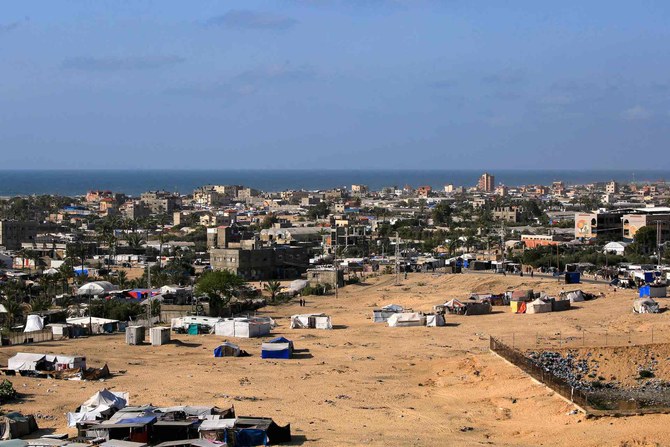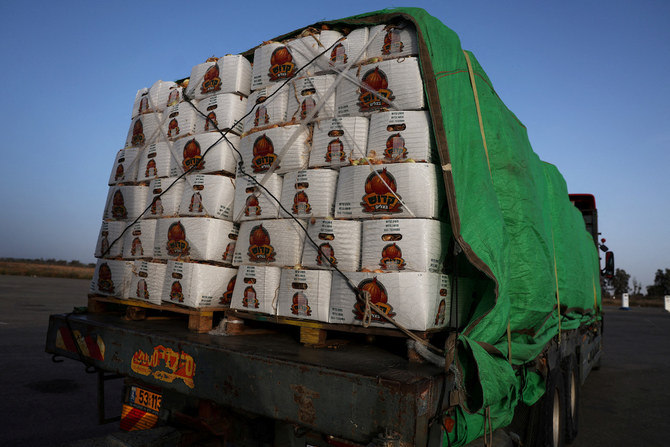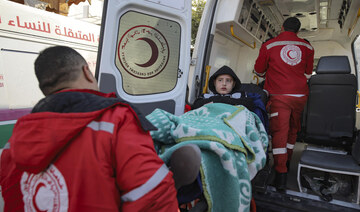DEIR AL-BALAH, Gaza Strip: Hamas fired a barrage of rockets from Gaza that set off air raid sirens as far away as Tel Aviv for the first time in months on Sunday in a show of resilience more than seven months into Israel’s massive air, sea and ground offensive.
There were no immediate reports of casualties or damage in what appeared to be the first long-range rocket attack from Gaza since January. Hamas’ military wing claimed the attack. Palestinian militants have sporadically fired rockets and mortar rounds at communities along the Gaza border, and the military arm of the Palestinian Islamic Jihad group later Sunday said it fired rockets at nearby communities.
The Israeli military said eight projectiles crossed into Israel after being launched from the area of the southern Gaza city of Rafah, where Israeli forces recently launched an incursion. It said “a number” of the projectiles were intercepted.
Earlier Sunday, aid trucks entered Gaza from southern Israel under a new agreement to bypass the Rafah crossing with Egypt after Israeli forces seized the Palestinian side of it earlier this month. But it was not immediately clear if humanitarian groups could access the aid because of fighting.
Egypt refuses to reopen its side of the Rafah crossing until control of the Gaza side is handed back to Palestinians. It agreed to temporarily divert traffic through Israel’s Kerem Shalom crossing, Gaza’s main cargo terminal, after a call between US President Joe Biden and Egyptian President Abdel-Fattah El-Sisi.
But the Kerem Shalom crossing has been largely inaccessible because of Israel’s offensive in Rafah. Israel says it has allowed hundreds of trucks to enter, but United Nations agencies say it is usually too dangerous to retrieve the aid.
The war between Israel and Hamas has killed nearly 36,000 Palestinians, according to Gaza’s Health Ministry, which does not distinguish between civilians and fighters in its count. The Health Ministry said the bodies of 81 people killed by Israeli strikes had been brought to hospitals over the past 24 hours.
Around 80 percent of Gaza’s 2.3 million people have fled their homes, severe hunger is widespread and UN officials say parts of the territory are experiencing famine.
Hamas triggered the war with its Oct. 7 attack into Israel, in which Palestinian militants killed some 1,200 people, mostly civilians, and seized some 250 hostages. Hamas still holds some 100 hostages and the remains of around 30 others after most of the rest were released during a ceasefire last year.
SOUTHERN GAZA LARGELY CUT OFF FROM AID
Egypt’s state-run Al-Qahera TV aired footage of what it said were trucks entering Gaza through Kerem Shalom. Khaled Zayed, head of the Egyptian Red Crescent in the Sinai Peninsula, which handles the delivery of aid from the Egyptian side of the Rafah crossing, said 200 aid trucks and four fuel trucks were scheduled to be sent to Kerem Shalom on Sunday.
Southern Gaza has been largely cut off from aid since Israel launched what it called a limited incursion into Rafah on May 6. Since then, over 1 million Palestinians have fled the city. Most had been displaced from other parts of besieged Gaza.
Northern Gaza still receives aid through two land routes that Israel opened during global outrage after Israeli strikes killed seven aid workers in April.
A few dozen trucks enter Gaza daily through a US-built floating pier, but its capacity remains far below the 150 trucks a day that officials hoped for. Aid groups say 600 trucks a day are needed.
NETANYAHU RESISTS PRESSURE TO END WAR
Netanyahu has said Israel must take over Rafah to eliminate Hamas’ remaining battalions and achieve “total victory” over the militants, who recently regrouped in other parts of Gaza where the military has operated.
Netanyahu faces growing pressure to make a deal with Hamas to free the remaining hostages, something Hamas has refused without guarantees for an end to the war and full withdrawal of Israeli troops. Netanyahu has ruled that out.
Scuffles broke out between police and protesters in Tel Aviv on Saturday after thousands again gathered to demand the hostages’ return. They called for Netanyahu’s resignation and demanded new elections.
The war also leaves Israel increasingly isolated on the world stage.
Last week, three European countries announced they would recognize a Palestinian state, and the chief prosecutor for the International Criminal Court requested arrest warrants for Netanyahu and Israel’s defense minister, Yoav Gallant, along with three Hamas leaders.
On Friday, the International Court of Justice ordered Israel to end its military offensive in Rafah. The top UN court also said Israel must give war crimes investigators access to Gaza.
Israel is unlikely to comply and has condemned the ICC’s move toward arrest warrants. Israel says it makes every effort to avoid harming civilians and blames their deaths on Hamas because the militants operate in dense, residential areas.
ISRAEL DENIES REPORT OF CAPTURED SOLDIER
Hamas claimed to have captured an Israeli soldier during fighting in northern Gaza and released video late Saturday showing a wounded man being dragged through a tunnel. Israel’s military denied any soldiers had been captured, and Hamas did not provide any other evidence to support its claim.
In a separate development, Israel’s military said it had detained a suspect over a widely circulated video in which a man dressed as a soldier threatens mutiny. In the video, the man says tens of thousands of soldiers were ready to disobey the defense minister over his suggestion that Palestinians should govern Gaza after the war and pledged loyalty to Netanyahu alone.
It was not clear if the man was on active duty, or when or where the video was made. Yair Netanyahu, the prime minister’s son, shared the video on social media, sparking criticism from political opponents. The prime minister’s office released a brief statement condemning all forms of military subordination.



























